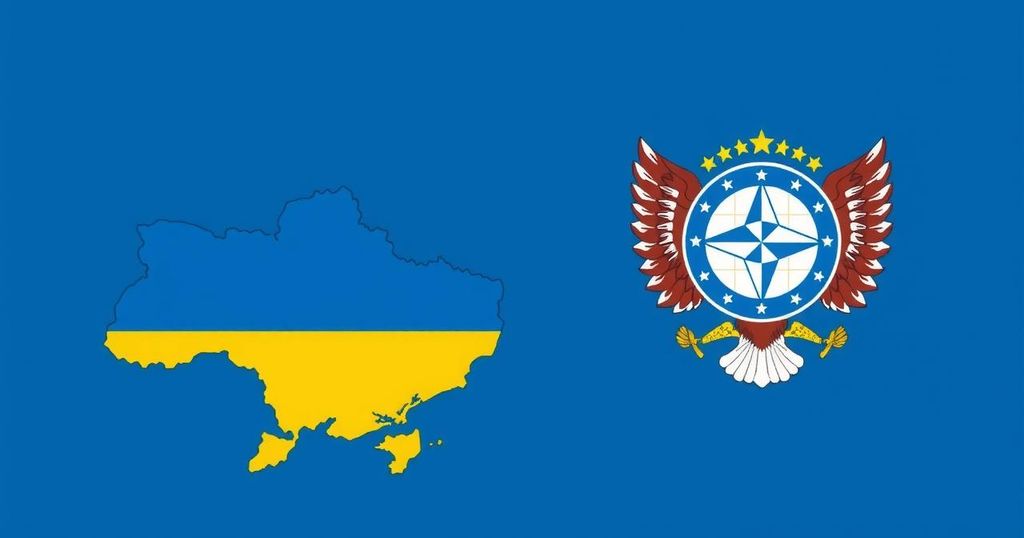NATO Faces Uncertain Future for Ukraine Aid Amidst U.S. Election Anxiety

As the U.S. presidential election approaches, NATO defense chiefs express increasing concern regarding the future of American military aid to Ukraine, particularly in light of a possible Trump victory. Despite Secretary of Defense Lloyd Austin’s reassurance of bipartisan congressional support, NATO officials highlight the necessity for European nations to augment their contributions as uncertainty looms over U.S. commitments amid continued Russian support from allies like North Korea and Iran.
The upcoming U.S. presidential election casts a shadow over NATO defense discussions, particularly concerning support for Ukraine. With Donald Trump potentially resuming the presidency, NATO allies are apprehensive about a possible reduction in U.S. military aid to Ukraine. Despite the uncertainty, Defense Secretary Lloyd Austin emphasized ongoing bipartisan support for Ukraine in Congress during a closed-door meeting with NATO counterparts. NATO officials, acknowledging this uncertainty, assert the need for European nations to enhance their military contributions and prepare for a future where U.S. support may wane. The possibility of a Trump victory raises concerns about the direction of U.S. assistance. Trump has previously cast doubt on whether he wishes for Ukraine to prevail in its ongoing conflict with Russia and has criticized Ukrainian President Volodymyr Zelensky’s management of the war. A senior NATO official expressed their worries, stating, “Optimistic is not the word I would use to describe the situation [in Ukraine] right now.” Russia continues to gain tactical advantages in the conflict, significantly outgunning Ukrainian forces and entering the winter months with a robust logistical foundation. In light of the changing dynamics, NATO is increasing its control over military assistance and troop training for Ukraine, aiming to mitigate the consequences if U.S. aid diminishes under a Trump-led administration. This strategy, however, is still in its early stages. In parallel, European nations are accelerating the production of vital military supplies to uphold their own security amidst Russian threats. Concerns extend to longer-term financial frameworks for Ukraine’s military and reconstruction efforts, which are currently hindered by internal EU disputes. Assistance from other global players, such as North Korea and Iran, adds to the urgency faced by NATO, with significant military supplies directed towards Russia. Secretary Austin reassured NATO allies regarding U.S. efforts to maintain military aid and bolster domestic production of weapons, while reiterating the importance of sustained support for Ukraine. Furthermore, NATO Secretary General Mark Rutte underscored the principle that aiding Ukraine transcends charity, presenting it as an investment in common security.
As geopolitical tensions reign high due to the conflict in Ukraine, the role of the United States within NATO remains pivotal. The looming U.S. presidential election introduces uncertainty regarding American foreign policy, especially concerning military support for Ukraine. NATO allies are cognizant of the implications a change in U.S. leadership could have on the alliance’s collective response to Russian aggression, particularly given former President Trump’s mixed signals about Ukraine’s struggle. The continuous military assistance and future obligations of the U.S. in supporting Ukraine are critical topics for NATO discussions.
The forthcoming U.S. presidential election injects significant uncertainty into NATO’s approach toward supporting Ukraine against Russian aggression. With apprehensions surrounding Donald Trump’s potential return to power and his ambiguous stance on Ukraine, NATO is proactively seeking to enhance European military contributions and consolidate control over assistance to Ukraine. Challenges persist with ongoing production deficits compared to Russian output and political hurdles within the EU regarding long-term funding for Ukraine. Ultimately, NATO remains committed to ensuring support for Ukraine is an integral aspect of collective security.
Original Source: www.cnn.com








